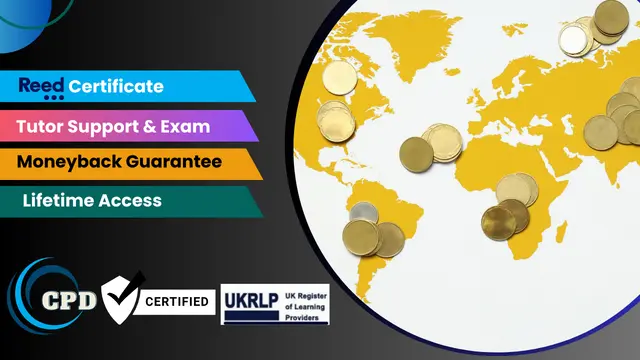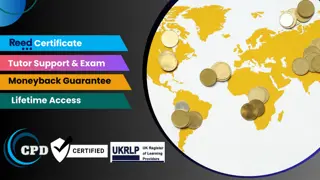
Global Economics: MNC, Markets and Geopolitics - CPD Certified
Free PDF Certificate | Self Study with Tutor Support | Moneyback Guarantee
Learndrive
Summary
- Reed Courses Certificate of Completion - Free
- Tutor is available to students
Add to basket or enquire
Overview
Unlock global financial insights with our comprehensive Global Economics course. Master Economics of international trade and finance for informed decisions. Navigate the Economics of globalisation, multinational firms, and economic growth. Address Economics of inequality, poverty, and environmental issues with real-world solutions. Stay ahead with Economics insights into the future of global governance.
Learning Outcomes of this Global Economics course:
- Define key terms in global Economics.
- Analyse economic principles behind international trade.
- Evaluate global financial systems in Economics.
- Examine the role of Economics in multinational corporations.
- Apply Economics theories to economic growth and development.
- Discuss the Economics of inequality and poverty.
- Identify Economics factors affecting emerging markets.
- Assess the Economics of labour markets globally.
- Compare different Economic systems.
- Formulate Economics-based solutions for environmental issues.
Curriculum
-
Introduction to Global Economics 10:39
-
International Trade 13:55
-
International Finance 17:29
-
Globalisation and Multinational Corporations 16:57
-
Economic Development and Growth 18:42
-
Inequality and Poverty 16:27
-
Emerging Markets 13:06
-
A Global View of the Labour Market 11:16
-
Economic Systems 15:23
-
Environmental Economics 16:46
-
Financial Crises and Risk 18:11
-
Future of Global Economics 15:55
-
Geoeconomics and Geopolitics 13:42
-
Global Economic Governance 14:08
Course media
Description
Deepen your grasp of the global fiscal landscape with our streamlined Economics course. Master key Economics aspects like international trade, finance, and governance. Acquire career-boosting skills applicable to today's dynamic Economics scenarios. Understand the Economics behind geopolitical shifts and financial crises. Seize this chance to become an Economics expert, adept at navigating our globalised world.
Who is this course for?
This Course is suitable for anyone interested to further progress there career in:
- Level 3 Certificate in Economics
- Level 4 Diploma in Economics
- Level 5 Diploma in Advanced Economics
- Level 3 Award in Microeconomics
- Level 4 Certificate in Macroeconomics
- Level 5 Diploma in International Economics
- Level 3 Certificate in Business Economics
- Level 4 Diploma in Applied Economics
- Level 3 Award in Financial Economics
- Level 4 Certificate in Development Economics
- Level 3 Certificate in Environmental Economics
- Level 4 Diploma in Behavioral Economics
- Level 5 Diploma in Public Economics
- Level 3 Award in Managerial Economics
- Level 4 Certificate in Labour Economics
- Level 5 Diploma in Monetary Economics
Requirements
This Global Economics Course does not have any prerequisites or formal requirements.
Career path
Taking Global Economics Course will open up a variety of career options for you.
- Economic development officer (£24,000 to £45,000)
- economic adviser (£24,000 to £45,000)
- Economist (£25,000 to £75,000)
- Investment Analyst (£22,000 to £65,000)
- Quantity Surveyor (£25,000 to £80,000)
- Insurance Risk Surveyor (£22,000 to £100,000)
Questions and answers
Currently there are no Q&As for this course. Be the first to ask a question.
Certificates
Reed Courses Certificate of Completion
Digital certificate - Included
Will be downloadable when all lectures have been completed.
Reviews
Currently there are no reviews for this course. Be the first to leave a review.
Legal information
This course is advertised on reed.co.uk by the Course Provider, whose terms and conditions apply. Purchases are made directly from the Course Provider, and as such, content and materials are supplied by the Course Provider directly. Reed is acting as agent and not reseller in relation to this course. Reed's only responsibility is to facilitate your payment for the course. It is your responsibility to review and agree to the Course Provider's terms and conditions and satisfy yourself as to the suitability of the course you intend to purchase. Reed will not have any responsibility for the content of the course and/or associated materials.


